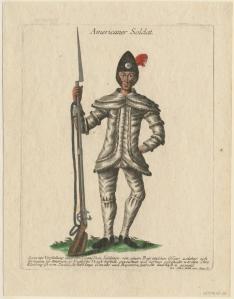“Remarkably stout and hardy men”
On Thursday, as I announced earlier, I’ll speak at Longfellow House–Washington’s Headquarters National Historic Site about “Washington’s Riflemen: Heroes or Headaches?”
Here are extracts from two journals in the summer of 1775 showing both sides of those Continental soldiers from Pennsylvania, Virginia, and Maryland.
First, Dr. James Thacher, then a surgeon’s mate, under the date of August 1775:
Here are extracts from two journals in the summer of 1775 showing both sides of those Continental soldiers from Pennsylvania, Virginia, and Maryland.
First, Dr. James Thacher, then a surgeon’s mate, under the date of August 1775:
Several companies of riflemen, amounting, it is said, to more than fourteen hundred men, have arrived here from Pennsylvania and Maryland; a distance of from five hundred to seven hundred miles. They are remarkably stout and hardy men; many of them exceeding six feet in height. They are dressed in white frocks, or rifle-shirts, and round hats.Second, Pvt. Aaron Wright of Pennsylvania, a rifleman himself, on 10 September:
These men are remarkable for the accuracy of their aim; striking a mark with great certainty at two hundred yards distance. At a review, a company of them, while on a quick advance, fired their balls into objects of seven inches diameter, at the distance of two hundred and fifty yards.
They are now stationed on our lines, and their shot have frequently proved fatal to British officers and soldiers who expose themselves to view, even at more than double the distance of common musket-shot.
Great commotion on Prospect Hill among the riflemen, occasioned by the unreasonable confinement of a sergeant by the adjutant of [Col. William] Thompson’s regiment; and before it was over, 34 men were confined, and two of them put in irons at headquarters in Cambridge; on the 12th, they were tried by a court-martial, and one was whipped 17 lashes, for stealing, and drummed out of camp.Tomorrow night, we’ll look at both sides of those troops.


No comments:
Post a Comment